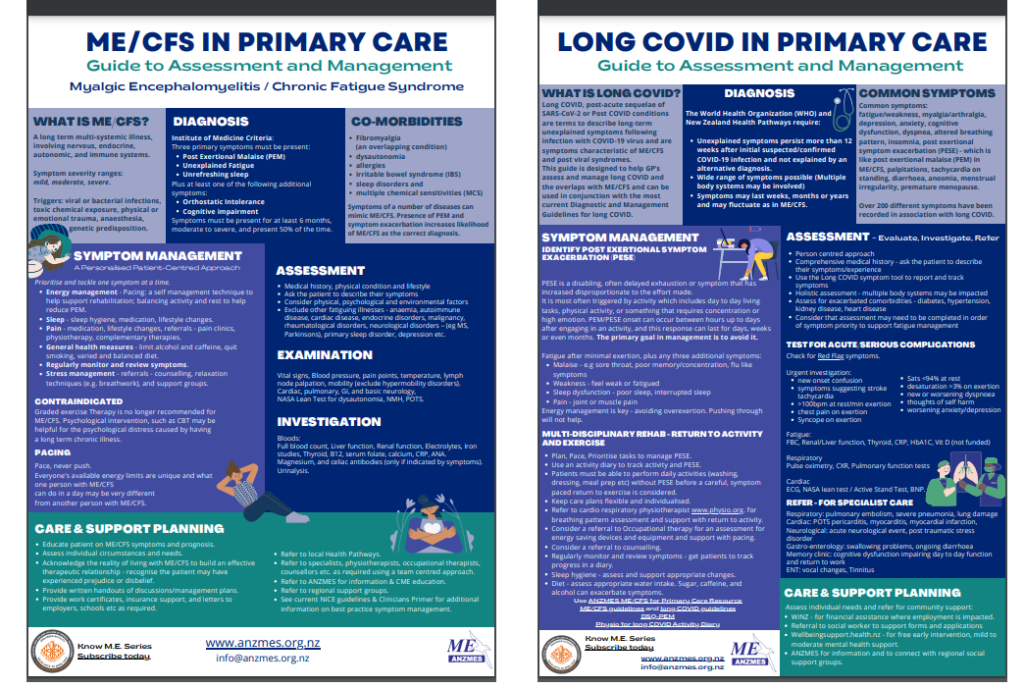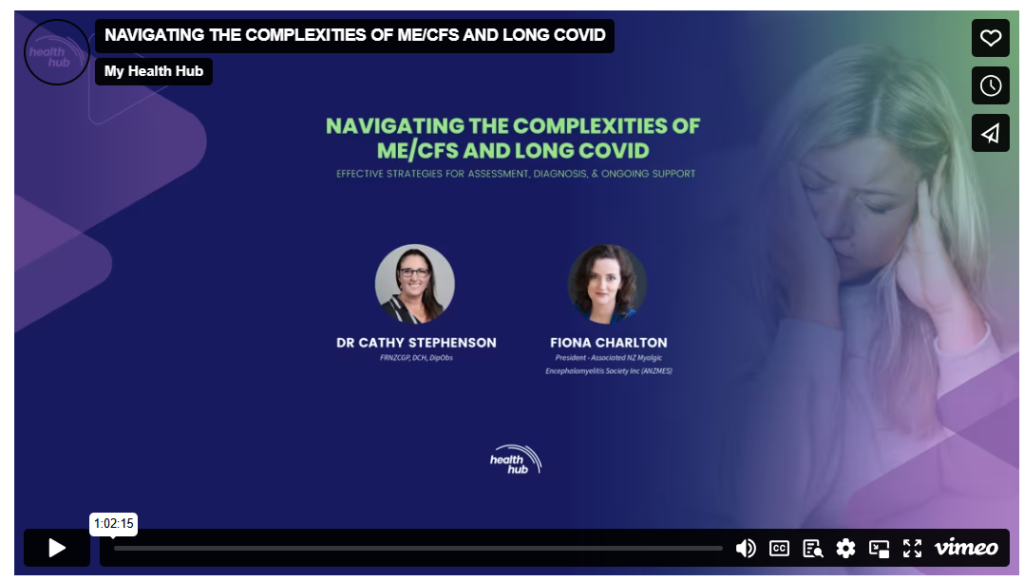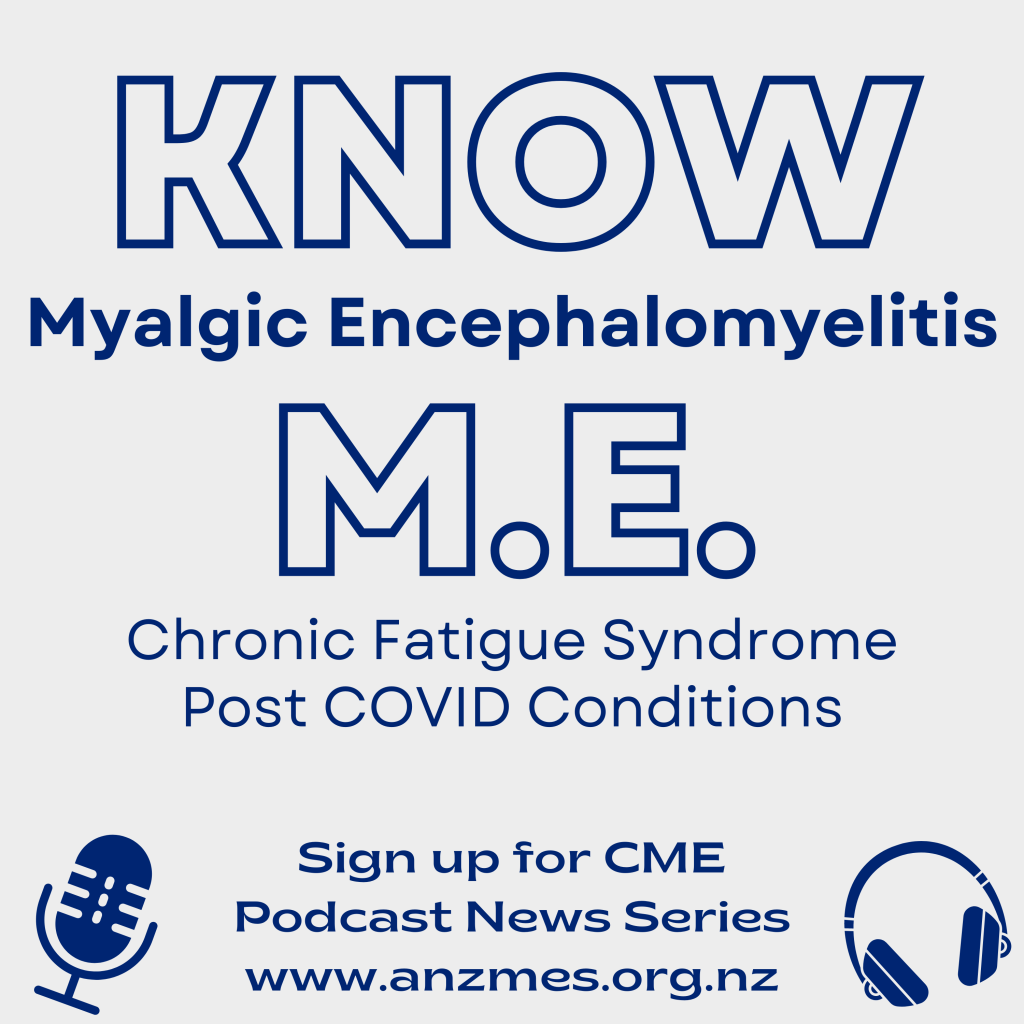Know M.E Video Podcast and News Series: sharing the latest medical research and up-to-date, relevant information to help clinicians, researchers and other health professionals stay informed about this challenging and often misunderstood condition: Myalgic Encephalomyelitis/Chronic Fatigue Syndrome (ME/CFS).
ANZMES is a RNZCGP registered provider of continuing education. Earn CME credits as you learn.
ANZMES held a long COVID Event (November 2022) with leading kiwi experts in the post viral field. To find out more visit our Event page here:
long COVID Event/
Best practice management of ME/CFS and long COVID

Primary Care Resources for ME/CFS and long COVID

Secondary Care resource for ME/CFS and long COVID

MyHealthHub – CME: Navigating the Complexities of ME/CFS and long COVID, Dr. Cathy Stephenson and Fiona Charlton https://myhealthhub.co.nz/navigating-the-complexities-of-me-cfs-and-long-covid-2/

A practical approach to understanding, assessing and managing ME/CFS, A webinar by Dr. Cathy Stephenson from 23 February 2022 on My Health Hub for Mobile Health. CPD point available: https://myhealthhub.co.nz/myalgic-encephalomyelitis-chronic-fatigue-syndrome-2/

More resources on our links page.
Severe-Very Severe ME/CFS and long COVID: resources
#IIMEC15 Invest in ME Conference 15 (2023)
Link for useful medical information when treating COVID-19 in patients with underlying myalgic encephalomyelitis/chronic fatigue syndrome (ME/CFS) and severe fibromyalgia (FM)
Information for Medical Professionals.
Myalgic Encephalomyelitis /Chronic fatigue syndrome, or ME/CFS, is a debilitating and complex disorder characterized by overwhelming fatigue and other symptoms that are not improved by bed rest and that may be worsened by physical or mental activity. Symptoms affect several body systems and may include weakness, severe fatigue, muscle pain, impaired memory and/or mental concentration, and insomnia, which can result in reduced participation in daily activities. In some cases ME/CFS may linger for years. Researchers have not yet identified exactly what causes ME/CFS though there are over 9000 papers released showing that the illness is biomedical. At present there are no tests to diagnose ME/CFS though some are patented and with more research to be released in the next year or two. Because many illnesses have fatigue as a symptom, doctors need to take care to rule out other conditions, which may be more treatable.
General Information
Managing chronic fatigue syndrome can be as complex as the illness itself, with over 100 symptoms arising from the immune, autonomic, and neuroendocrine system malfunctions. Symptom management is an essential part of care. Health professionals play a crucial role in helping patients manage their symptoms effectively. Symptoms can vary a lot over time. Thus, people with ME/CFS should closely monitor their health and let their doctor know of any changes; and doctors should regularly monitor their patients’ condition and change treatment strategies as needed.
A team approach involving doctors and patients is one key to successfully managing ME/CFS. Patients and their doctors can work together to create an individualized treatment program that best meets the needs of the patient. This program should be based on a combination of therapies that address symptoms, coping techniques, and managing normal daily activities.
ME/CFS affects patients in different ways, and the treatment plan should be tailored to address symptoms that are most disruptive or disabling for each patient. Symptom relief is the main goal. However, expecting a patient to return to normal activities should not be the immediate goal, because the physical and mental exertion needed to try to reach that goal too quickly may be too much and aggravate the illness.
Because ME/CFS is a complicated illness, its management may require input from a variety of medical professionals. Patients benefit when they can work in collaboration with doctors and other health care professionals, making up a multi-disciplinary team.
ME/CFS Primer for Clinical Practitioners.
The International Association for Chronic Fatigue Syndrome/Myalgic Encephalomyelitis (IACFS/ME) has released the ME/CFS primer for Clinical Practitioners which provides management advice directed at primary care physicians and other health care providers.
The goal of the Primer is to provide the information necessary for clinicians to understand, diagnose, and manage the symptoms of ME/CFS. The text was developed over two years by the 11-member Primer Committee and externally reviewed by a number of international ME/CFS specialists and advocates.
Doctor Ros Vallings, ANZMES Medical adviser, who is a board member of IACFS/ME is a member of the Primer Committee.
Highlights of the Primer include:
- A summary of the pathophysiological effects of ME/CFS to date
- A user-friendly diagnostic worksheet utilizing the Canadian Consensus Criteria
- Straightforward treatment suggestions covering an array of ME/CFS symptoms
- Emphasis on post-exertional malaise and activity management
- Sections on special populations/ problems (e.g. severely affected, pediatric ME/CFS, pregnancy)
The Primer can be downloaded here and we thank the IACFS for allowing us to put this link on our webpage.
An overview of The Canadian Consensus document for Clinical Case Definition and Guidelines by Bruce M. Carruthers and Majorie I. van de Sande can be read here: https://www.investinme.org/Documents/PDFdocuments/Canadian_ME_Overview_A4.pdf
The Adult and Paediatric International Primer Consensus can be found here: https://www.investinme.org/Documents/Guidelines/Myalgic%20Encephalomyelitis%20International%20Consensus%20Primer%20-2012-11-26.pdf
The New International Consensus Criteria for ME
Reference: Carruthers et al. Myalgic Encephalomyelitis: International Consensus Criteria, The Journal of Internal Medicine, July 2011.
The new criteria designate ME as the appropriate biological name for the illnesss, and put aside the CFS label as confusing and overly-focused on the symptom of fatigue.
The 2003 Canadian Consensus Criteria were used as a starting point, but significant changes were made. Rather than pathological fatigue, the cardinal symptom of the newly defined ME is post-exertional malaise now termed, post-exertional neuroimmune exhaustion (PENE). Also the six-month waiting period before diagnosis is no longer required.
The biological focus in the article for the new definition of ME is clear, consistent, and unequivocal. The ultimate value of the new definition will be determined by our researchers, clinicians, and policy makers. There are no ready answers about the impact of the re-defined ME on important issues such as illness credibility, physician willingness to diagnose and treat ME, and disability determinations.
International Consensus Criteria for ME Link.
10th Invest In ME International Conference
10th ME/CFS Conference Notes 2015 – Ros Valling
Conference Notes 2021 – Ros Valling, Sarah Dalziel
Pediatric Case Definition for ME/CFS.
By 2006, the International Association of Chronic Fatigue Syndrome Working Group for a ME/CFS Pediatric Definition developed and published (in the Journal of Chronic Fatigue Syndrome, v. 13 n.2/3, 2006) a comprehensive “Pediatric Case Definition for Myalgic Encephalomyelitis and Chronic Fatigue Syndrome.” The paper also included an instrument (a comprehensive questionnaire) that doctors and other professionals can use to specifically assess CFS/CFIDS/ME in children.
The International Association of CFS, (now the International Association of CFS/ME) is an international group of CFS/ME researchers and clinicians. Under its auspices, a number of the leading researchers and clinicians in the field of pediatric CFS/CFIDS/ME came together to develop the definition. These included: Dr. Leonard Jason, Dr. David Bell, Dr. Charles Lapp, Dr. Karen Jordan, Dr. Kenny de Meirlier, and Dr. Alan Gurwitt (a long-time member of the Massachusetts CFIDS/ME & FM Association), along with other experts.
The entire 2006 Pediatric case definition can be accessed (along with other case definitions) at the M.E. Society for America link:
http://www.cfids-cab.org/MESA/ccpc.html
You can also download a free copy of the pediatric CFS/CFIDS/ME assessment instrument, the DePaul Pediatric Health Questionnaire at
http://www.cfids.org/bonus/pediatrictool.asp.
This 2017 article discusses the Primer written by The International Writing Group for Pediatric ME/CFS https://www.frontiersin.org/articles/10.3389/fped.2017.00121/full
In 2008, a slightly revised version of the 2006 pediatric case definition was published:
Jason et al., “A Case Definition for Children with Myalgic Encephalomyelitis/Chronic Fatigue Syndrome,” in Clinical Medicine: Pediatrics, 2008: 53-57.
This shorter and revised version can be accessed at the following link: http://www.la-press.com/a-case-definition-for-children-with-myalgic-encephalomyelitischronic-f-a1147 (The 2006 definition is the most comprehensive, along with its assessment instrument; but the 2008 version is probably more readable and usable for general pediatricians.
Assessment and Treatment of Patients of ME/CFS: Clinical Guidelines for Psychiatrists
The Clinical Guidelines for Psychiatrists by Eleanor Stein is a good resource for clinicians who are seeking to understand the distinctions between ME/CFS and psychiatric disorders.
Please see PDF
http://sacfs.asn.au/download/guidelines_psychiatrists.pdf
An exploration of the key clinical issues
The ME Association publication ME/CFS/PVFS An exploration of the key clinical issues, written by Dr Charles Shepherd and Dr Abhijit Chaudhuri of the University of Glasgow.
This a very useful guide for Medical Professionals . As the booklet was aimed at ‘mainstream’ medical professionals, the ‘Treatments’ section of the booklet focuses mainly on ‘mainstream’ treatments; there is a short discussion on complementary methods. The 2019 book is now available.
https://www.meassociation.org.uk/shop/books/mecfspvfs-an-exploration-of-the-key-clinical-issues/.
Chronic fatigue syndrome/myalgic encephalomyelitis Managing CFS/ME in general practice: new ideas
This has been written by Dr Vicki Mount, General Practitioner, MBChB, DipPaeds and Dr Ros Vallings, ANZMES medical adviser, has reviewed this article for the Goodfellow group, Auckland
Health Navigator NZ Chronic Fatigue Syndrome.
Here is the link for the Navigator NZ site for ME/CFS reviewed by ANZMES Medical Adviser Dr Ros Vallings.
US ME/CFS Clinicians Coalition
The US ME/CFS Clinicians Coalition have launched their own webpage, see below for link to their page.
Physios for ME
A group of physiotherapists in the UK with a special interest in ME/CFS.
Ministry of Health Position Statement on the management of unvaccinated individuals in healthcare settings
Ministry-of-Health-position-statement-on-the-management-of-unvaccinated-…-1-1


